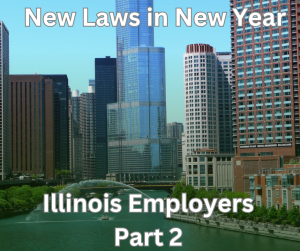Illinois small businesses need to get up to speed on a variety of state legislation passed in the previous session that came online on January 1.
We covered several new provisions in a post last week, including a higher state minimum wage and legislation prohibiting “capture audience meetings” focused on religion or politics, requiring “pay scale and benefits” information in all job postings, adding new requirements for businesses that want to employ children under age 16, and banning non-compete agreements for certain classes of workers.
Among other new laws that have taken effect so far in 2025:
- Amendments to the Illinois Personnel Record Review Act, which requires small businesses with five or more employees to allow current personnel and those terminated within the previous year to review, copy or get copies of records twice per calendar year. The amendments expand the list of documents employers must provide to include employee handbooks, legally binding employment-related contracts or agreements, or written employer policies or procedures related to qualifications for matters like employment, promotion, compensation and discharge. Another amendment states that employer documents containing trade secrets, client lists, sales projects and financial data are *not* required to be disclosed. And finally, the changes clarify that employees must make any requests in writing and that electronic communications qualify as “written”—while deleting a previous provision that gave employers the right to require that requests be made on an employer-supplied form.
- Amendments to the Illinois Human Rights Act that widen its list of protected classes and prohibit employers from discriminating against current or prospective employees based on their “family responsibilities,” ranging from providing transportation to medical appointments for those unable to do so, to providing emotional support to a family member receiving care for a serious medical condition. Notably, employers are not required to change policies related to leave, scheduling, attendance or punctuality. A separate amendment prohibits discrimination based on “reproductive health decisions.”
- Amendments to the Right to Privacy in the Workplace Act that clarify Illinois employers are not required to enroll in the federal E-Verify program—which confirms eligibility by comparing the employee’s I-9 form with existing federal records—or any other electronic employment verification system unless affirmatively mandated to do so. The amendments also state that employers cannot require more than federal law does with regard to work verification; and that those who use a verification system and believe they have found a discrepancy must provide the employee with the reason, specific documents found lacking, instructions on how to fix the issue, and an explanation of the employee’s rights. If a federal or state agency flags a discrepancy, employers must notify the employee within 72 hours and provide the name of the agency, date the employer found out, the issues involved, and a copy of the notice received.
- Amendments to the Illinois Whistleblower Act that among other provisions prohibit employers from retaliating against an employee who threatens to go public with information about illegal or otherwise dangerous activity on the employer’s part, while also specifically requiring that the employee must have a “good faith belief” that the employer is either violating a law or regulation or otherwise creating a danger to the health and/or safety of employees and/or the public. The amendments also give whistleblowers the right to seek new remedies for retaliation including: injunctive relief, back pay at a 9% annual interest rate, front pay, liquidated damages of as much as $10,000, and a required $10,000 civil fine paid to the employee. Finally, the Illinois Attorney General is given authority to investigate and seek remedies.
- Amendments to the Illinois Wage Payment and Collection Act that require employers to keep pay stub records for all employees for at least three years, including those who have been terminated in the meantime, and that mandate current and former employees are able to receive copies of said stubs. Requests need not be made in writing, although employers can require this, and employers have 21 days to provide paper or electronic records; although if a former employee cannot access the electronic system, the employer must provide their last years’ worth of stubs on paper.
If you have questions or want to consult about any of these new laws, please contact your Chicago or suburban small business attorney. We stand ready to assist.
 Chicago Business Attorney Blog
Chicago Business Attorney Blog


